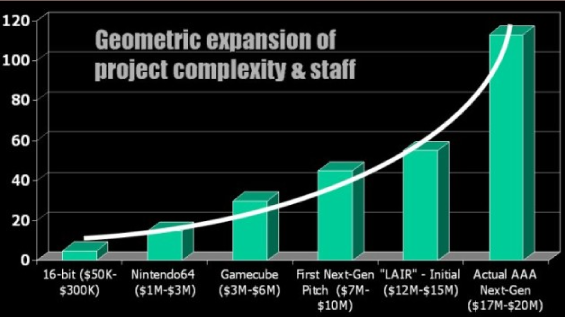Economic woes and studio closures seem to suggest not.
Back in 2005, next-gen felt exciting. It felt like we were breaking into new territory in a way that we haven't seen since the jump to 3D over a decade earlier. Sony and Microsoft were changing the way we look at games with HD. Nintendo was changing the way we play games with motion controls. All companies were looking for a way to improve the online space and player connectivity. It was an exciting time for gamers indeed.
Fast forward to 2013, and we're reaching another end and another beginning. Nintendo's Wii U marked the beginning of yet another console generation, with Sony and Microsoft no doubt not far behind. But times are different now. The excitement for next-gen just isn't there. Perhaps it's because of the internet space nowadays, where it's easy to gain access to new information on new technologies. Perhaps it's because of the era of the smartphone and tablet computer, where we now are able to do pretty much everything with the little device in our hands.
Or perhaps we are, simply, not ready for the next generation.

That statement sounds a bit ridiculous, doesn't it? How can we not be ready to progress? How can we not be ready for new technology? Well that's because we are. We are ready to move on to what's next, ready to get our hands on the next best thing. As gamers, we desire to experience something new and fascinating, something that will open our minds to new possibilities and once again pave way to new frontiers.
No, gamers are not the ones that aren't ready for the next generation. We aren't the ones who determine what's next-gen and what's not. We don't determine when next-gen starts. It's up to Nintendo, Sony, and Microsoft to make new consoles and sell them on the market. It's up to third parties to help support and propel next-gen technology in unique ways. Our only role is to influence the market when it comes to those games, and that's only possible when next-gen actually begins.
So, to summarize my point in one sentence, I don't think the gaming industry is ready for next-gen.
There are a couple of reasons for this, but the main reason is cost. We know that Nintendo is selling their new $300 USD Wii U at a loss. That's them taking a loss, even at a market price of $300. Now, I understand that a lot of that money goes into the GamePad, but it's hard to imagine the GamePad costing too much more than regular wireless controllers do... especially since Sony's own six-axis controllers still cost a fortune.
But never mind the debate of the Wii U's profitability. My point is that Wii U is just slightly more powerful than the PS3 and X360, yet it still costs so much to manufacture and market. Imagine if all of those rumors of the next PlayStation and Xbox are true; let's assume they are over quadruple the power of the Wii U. How much are they going to cost to make? How much will they market? Can Sony and Microsoft afford such risks?

If development costs only double, that will only mean more studio closures.
Another thing to consider is how third parties would react to this. Epic Games CTO Tim Sweeny said at the Montreal International Game Summit that video game development with these super-powerful next-gen systems would "only about double the cost" of current-gen development. Only about double the cost. Seriously? We have huge third party publishers like SEGA and THQ only barely making it through this gen. Development studios all over the world are shutting down, great studios like Zipper and 38 and Radical and Midway and Hudson and Ignition and countless many others. Even bigger publishers like Electronic Arts are having financial woes. If development costs only double, that will only mean more studio closures. Publishers like THQ and SEGA simply won't survive.
You can make the argument that developers don't have to use all that power for their games; I mean, just because the power is there doesn't mean you need to utilize all of it. This statement is true, but it also brings about another problem: what's going to stop Sony and Microsoft – or even larger publishers like Activision – from using all of that power? What you end up getting are large AAA titles that look amazing, while games from lesser studios look like significantly worse. In other words, most games will look like crap compared to the stuff that the first party and a few bigger third parties are putting out.
And all of this is coupled with the fact that we're still knee-deep in a global economic recession. We're still a few years away from a full recovery, and game devs – especially smaller studios – need a predictable market to plan our their schedules for the upcoming year. A new console cycle, especially one with drastic change, would lead to an unpredictable shift in the market. Of course, under normal circumstances, this would be exciting, as it adds an element of chance and surprise into the mix. But at a time when many development studios are simply struggling to survive, a new generation may not exactly be the best thing.

Of course, I may be completely wrong. A new console generation could stimulate new growth in the gaming industry, leading to more jobs and higher consumer interest. The next Xbox or PlayStation may not have quadruple the power of current-gen consoles, and instead pull a Wii and have some sort of gimmick while making little progress in terms of power. We may find tons of gold hidden under the glaciers of Alaska, immediately pulling us out of the recession.
But whatever the case, what happens in the next twelve months is going to be interesting. A new console generation has begun, and we're in the middle of it. Hurray for us!
What do you guys think? Is the industry really ready for next-gen?
![Amazing Spider-Man Finale Features New [SPOILER] Costume](../../../../../../assets1.ignimgs.com/2018/06/01/untitled-br-1527892808294_small.jpg)